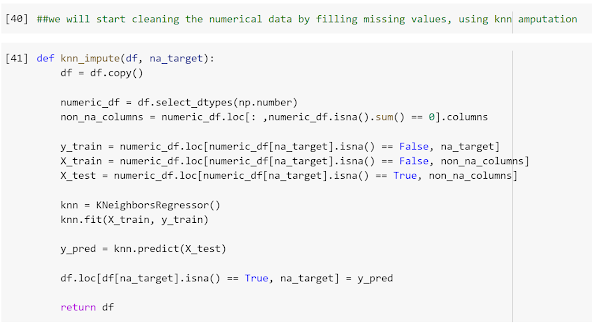House Price Prediction (Kaggle competition)
Introduction
Predicting the sale price of a house is a real-life problem that can have a significant impact on the housing market. Accurately predicting the sale price of a home can benefit both buyers and sellers by providing them with a more accurate understanding of a home's value. However, the real estate market is constantly changing and predicting the sale price of a house can be a difficult task. In this blog post, we will explore how we can use advanced regression techniques and machine learning algorithms to accurately predict the sale price of a house.
The Problem
The real estate market is constantly changing and predicting the sale price of a house can be a difficult task. Real-world issues like estimating a home's sale price can have a big impact on the housing market. By giving a better idea of a house's value, accurate home sale price predictions can be advantageous to both buyers and sellers. Accurate price forecasts can assist purchasers in making more knowledgeable judgments about their purchases and may even prevent them from overpaying for a property. Accurate price forecasts can assist sellers in setting a more appealing asking price and even expedite the sale of their home.
However, the problem is challenging because the real estate market is affected by many variables such as local economy, housing market conditions, and interest rates. Also, the prices of houses can vary greatly depending on the location, type of house and other factors. 'House pricing prediction' will provide a great opportunity to apply machine learning techniques to a real-world problem and make valuable predictions that can be used by real estate agents, investors, and homebuyers.
The Solution
With the advancements in artificial intelligence (AI), it is now possible to use machine learning models to accurately predict the sale price of a house. We can use regression techniques and machine learning algorithms to assess a variety of traits and attributes associated with a given property in order to address this issue. The goal of this project is to train an ML model to predict the sale price of a house based on a set of input features. These features can include characteristics of the house such as size, number of bedrooms, location, age, and other factors that can affect the price of a house. By doing this, we can offer
Steps Followed
-Data Collection: The first step in this project was to collect the data for training and testing the model. The dataset used for this project is available on Kaggle and is part of the competition named “House Prices - Advanced Regression Techniques” (https://www.kaggle.com/c/house-prices-advanced-regressiontechniques). This dataset refers to the reality of residential homes in Ames, Iowa and includes information on houses that have already been sold, such as the sale price and the input features.
-Data Exploration: Once the dataset was obtained, we performed an initial exploration of the data. This included analyzing the variable types, missing values, and the distribution of the target variable.
-Data Cleaning: After the initial exploration, we performed data cleaning tasks to ensure that the dataset was ready for modeling. This included filling missing values, transforming categorical variables into numerical, and removing outliers.
-Feature Selection: Next, we selected the most relevant features from the dataset to be used in the model. We used various feature selection techniques such as correlation matrix, chi-square test, and recursive feature elimination.
-Model Building: With the cleaned and preprocessed dataset, we built a machine learning model to predict the sale price of a house. We used advanced regression techniques such as Random Forest, XGBoost, and LightGBM to build the model.
-Model Evaluation: After building the model, we evaluated its performance using various evaluation metrics such as R-squared and root mean squared error (RMSE). We also compared the performance of the different models built to select the best performing one.
Bibliography
[1] Marill, K. A. (2004). Advanced statistics: Linear regression,part I: Simple linear regression. Academic Emergency Medicine, 87 - 93. doi:10.1111/j.1553-2712.2004.tb01378.x
[2] python-reference_catboostregressor. (2022, 04 30). Retrieved from catboost.ai:
https://catboost.ai/en/docs/concepts/python-reference_catboostregressor
[3] Sykes, A. O. (1993). An introduction to regression analysis.
[4] Fedorov, N., & Petrichenko, Y. (2020). Gradient boosting–based machine learning methods in real estate market forecasting. ITIDS 2020. doi:10.2991/aisr.k.201029.039
[5] Arora, M., Sharma, A., Katoch, S., Malviya, M., & Chopra, S. (2021). A state of the Art Regressor Model’s comparison for effort estimation of Agile Software. 2021 2nd International Conference on Intelligent Engineering and Management (ICIEM). doi:10.1109/iciem51511.2021.9445345
[6] Dean De Cock. “Ames, Iowa: Alternative to the Boston Housing Data as an End of Semester Regression Project”. In: Journal of Statistics Education 19.3 (2011).







Niciun comentariu:
Trimiteți un comentariu